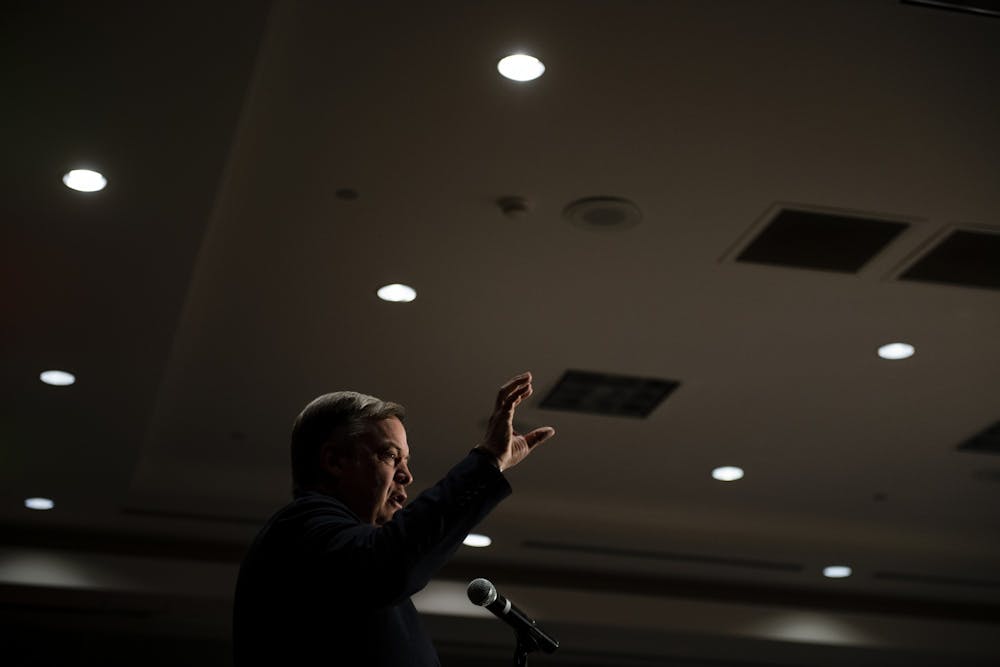ASU President Michael Crow released a letter to the University community Monday evening concerning the death of George Floyd, the 46-year-old Black man killed by police in Minneapolis last week.
Crow asked students, deans and faculty to facilitate initiatives and programs based on specialty, on a college-by-college basis "for protecting and defending the rights of individuals."
The letter opens, addressing the scene of 2020, rattled by a global pandemic and nationwide protests over years of injustice and police brutality, but missing from the almost 1,400-word letter are the words protest, racism, racist, inequality and police brutality.
President of The Black African Coalition, Aniyah Braveboy, a senior studying public policy, said members of BAC "were not impressed" with the letter.
"He failed to acknowledge the people that are being affected by the social injustice and racism that is happening nationally," Braveboy said. "He not once stated he feels for the Black students or advocates for Black students.
"The BAC wishes he, in fact, acknowledged what is happening," Braveboy said.
The statement from Crow says the University has been "slow in the concept of redesigning, reconceptualizing, restaffing, re-empowering and enabling the institutions that we ... have helped to design, create, staff, and assess."
While Crow did not address many issues directly, he did acknowledge that ASU and its surrounding community has work to do.
"We, the university community broadly and Arizona State University specifically, are, in fact, an aspirational institution and we have, in fact, been woefully inadequate, up to this point, in our own efforts to facilitate the means by which higher aspirational attainment might be achieved for these central goals to our society," Crow said.
Kiarra Spottsville, president of the National Association of Black Journalists at ASU had previously been vocal about the University's lack of response and addressed the statement once it was released.
"ASU statement released, sounds very much like a what students and faculty can do for ASU instead of what ASU can do for students and faculty," Spottsville tweeted. "I do appreciate the transparency that ASU doesn't know what to do, but that isn't enough for me."
The statement from Crow admits the University has been slow to change institutions it helped create and uphold. Students say the University admitting the fault has been a reluctant process of accountability.
The University's response to the demonstrations "took very long," said Edward Apraku, a senior studying environmental civil engineering, in an email.
"The longer ASU took, the more detrimental it was, especially considering we are one of the largest universities in the United States and always showcase how diverse and inclusive our student body is," Apraku said.
Apraku said he thought it was "fine" to ask deans for specific programs, "but there needs to be University-wide initiatives as well," he said.
Crow said the letter rights guaranteed by the Constitution, a document he said embodies ideals of the nation, are disproportionately distributed. The letter says "aspirational goals" of the Constitution cannot be met "unless we are willing to face our failings, call out our injustices, and drive towards the changes needed to achieve the common goals America was built to achieve."
"Although we have made progress through our struggles and our changes, it is nonetheless jolting to see these inequalities manifested through the unfair treatment of individuals based on their race and ethnicity by the very government designed to protect and defend their rights," Crow said.
Crow suggests our goals should be "towards the idea of fighting for and driving toward and working toward our national aspirational goals, particularly of equality and justice."
Apraku said references to the Constitution and acceptance that ASU as an institution "is slow to change the systems they have set in place" threw him off, when an action "without deliberation" could have been to donate money, he said.
The BAC is scheduled to meet with deans across the University to open up discussion and bring awareness to the school, according to Braveboy
"It's one thing for a Black coalition to make a statement for Black Lives Matter, however, it is different for an entire campus, a predominantly white campus, to make a statement against police brutality and social injustice," Braveboy said.
Reach the reporters at pjhanse1@asu.edu and wmyskow@asu.edu and follow @piperjhansen and @wmyskow on Twitter.
Like The State Press on Facebook and follow @statepress on Twitter.

Wyatt Myskow is the project manager at The State Press, where he oversees enterprise stories for the publication. He also works at The Arizona Republic, where he covers the cities of Peoria and Surprise.

Piper Hansen is the digital editor-in-chief at The State Press, overseeing all digital content. Joining SP in Spring 2020, she has covered student government, housing and COVID-19. She has previously written about state politics for The Arizona Republic and the Arizona Capitol Times and covers social justice for Cronkite News.




